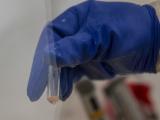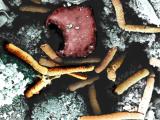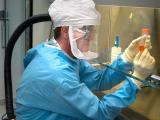Oct 2, 2003 (CIDRAP News) The federal government awarded two contracts totaling more than $150 million this week for further testing and initial production of new anthrax vaccines designed to be safer and require fewer doses than the existing vaccine.
The National Institute of Allergy and Infectious Diseases (NIAID) awarded a $71.3 million contract to Avecia, based in Manchester, U.K., and an $80.3 million contract to VaxGen Inc, Brisbane, Calif. Each contract calls for clinical trials of the vaccine and production of 3 million doses, according to company and NIAID officials.
Both companies were awarded smaller NIAID contracts a year ago for development and testing of their respective vaccines. Both vaccines use recombinant forms of protective antigen (PA), a component of the toxin produced by anthrax bacteria (Bacillus anthracis). The existing anthrax vaccine, Biothrax, involves a mix of proteins derived from cultures of a nonvirulent strain of anthrax.
The new vaccines are intended to provide immunity in three or fewer doses. Biothrax, which is used by the U.S. military, is given in six doses over 18 months, followed by annual boosters. The anthrax vaccination program has been resisted by some military personnel, who argue that it can cause serious side effects.
Commenting on why the NIAID is contracting for millions of doses of vaccines that have not been licensed or fully tested, the NIAID's Ed Nuzum told CIDRAP News, "It's to meet a national requirement. . . . Based on the direction we're getting and the timelines we have, we need to get as much vaccine as we can, get the best quality we can and the soonest possible time." Nuzum is a senior project officer in the NIAID's Office of Biodefense Research Affairs.
VaxGen's vaccine was first developed by the U.S. Army Research Institute of Infectious Diseases, which successfully tested the compound in years of studies in primates, according to Lance Ignon, the firm's vice president for corporate communications. Phase I clinical trials of the vaccine's safety and immunogenicity are under way at four sites and are scheduled for completion in February, he said. Preliminary data from the trials were evaluated by the Centers for Disease Control and Prevention and helped win the contract for VaxGen, Ignon told CIDRAP News.
In a news release, VaxGen stated, "The new NIAID contract is intended to fund animal studies, Phase II clinical trials, the scale up and validation of the vaccine manufacturing process and production of 3 million doses of the finished product."
An Avecia news release stated that the new vaccine is intended to confer immunity in three or fewer doses and provide protection even when given shortly after exposure. The company has worked with the United Kingdom Defence Science and Technology Laboratory on developing techniques for large-scale manufacture of the vaccine, officials said. Avecia also collaborated with U.S.-based Baxter Healthcare Corp. in preparing its bid for the contract. Baxter will handle finishing and final packaging of the vaccine, according to the release.
Nuzum said Avecia and VaxGen competed with other firms for the new contracts. "It was an open and fair competition for this round of awards," he said. "They didn't get these just because they already had contracts; other companies had opportunities to bid."
While the new contracts aim to move the anthrax vaccines toward large-scale production, the "Bioshield" legislation now pending in Congress could provide a bigger boost to anthrax vaccine production, according to Nuzum and VaxGen officials.
The VaxGen news release said the Bioshield bill would provide $1.4 billion to buy and maintain a stockpile of 60 million doses of a recombinant PA anthrax vaccine between 2004 and 2013. The bill was passed by the House in July and is awaiting action in the Senate, the company noted.
If Bioshield is enacted this year, the Department of Health and Human Services could begin buying a PA anthrax vaccine for an emergency stockpile as early as next year, before the vaccine is approved for commercial use, the VaxGen statement predicted.



















